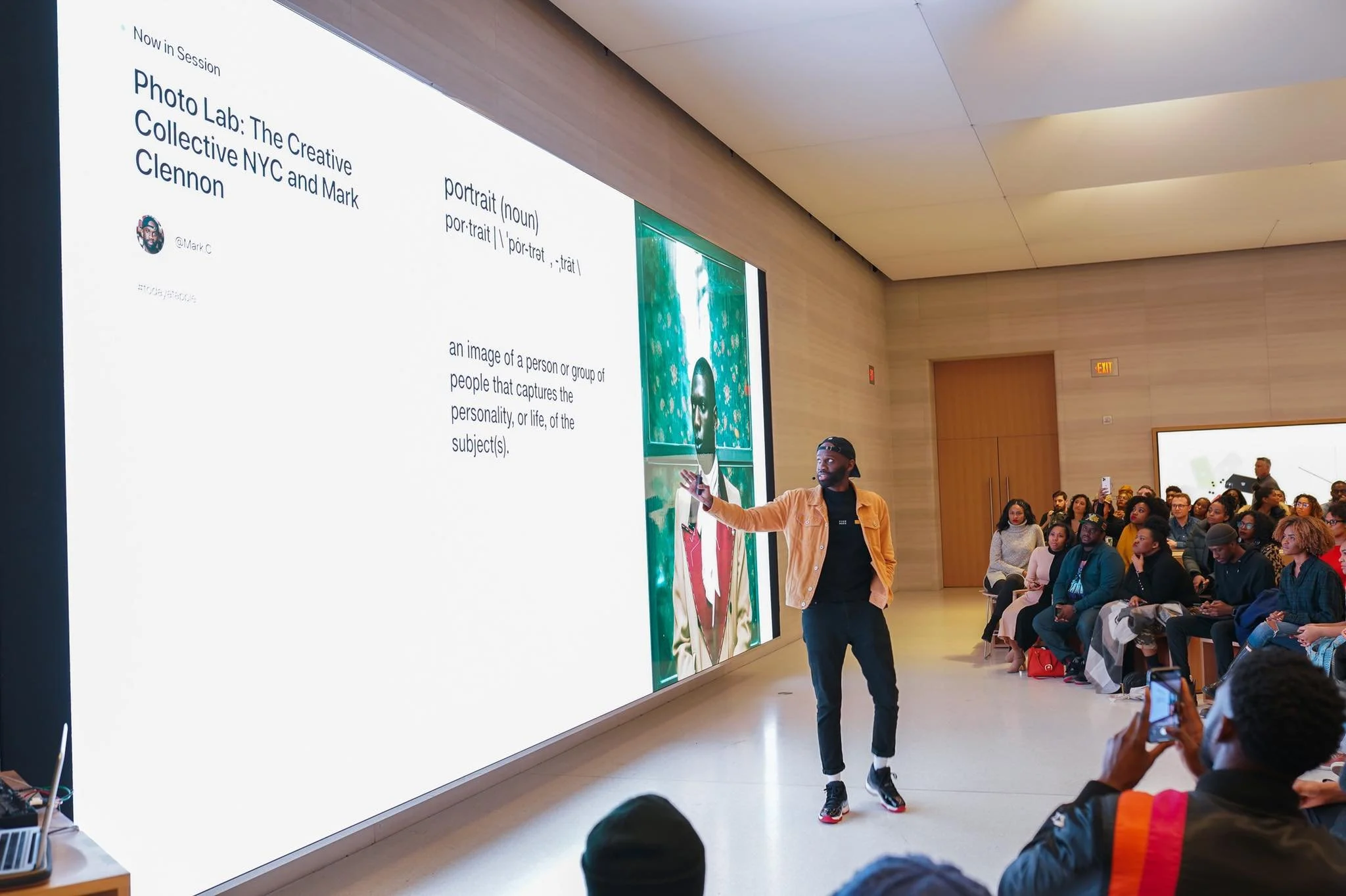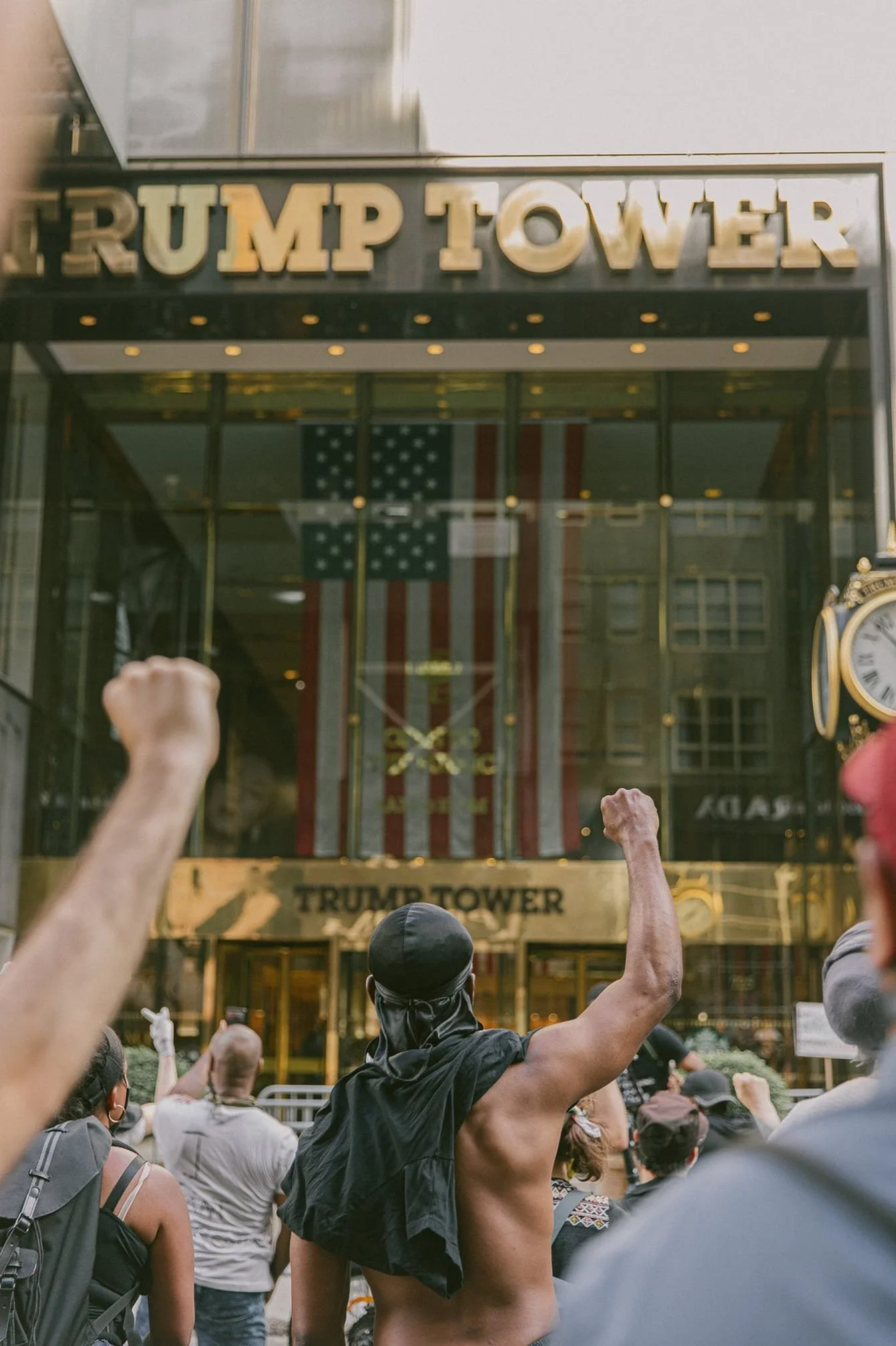Mark Clennon teaching a class in partnership with Apple (All rights reserved to owner)
Mark Clennon is a Harlem-based photographer whose powerful image of a protester raising a fist outside Trump Tower during the George Floyd protests resonated globally. His work captures the raw emotion and resilience of Black communities, blending artistry with activism to tell stories that often go unseen. Through his lens, Clennon continues to document moments that reflect the strength and spirit of the movement.
In college you took a few detours picking your major before landing in advertising and Public Relations. What would you say to young adults who think they’re supposed to have everything figured out?
MC: I still don't have everything figured out. I think the moment you feel like you have everything figured out, that's when you kinda stop challenging yourself and exploring what you might be capable of. So for me I knew what feeling I wanted to have when I'm doing work or when choosing a career. Even when I chose my major in graduate, I still didn't end up exactly doing what I majored in. But I know I was picking up tools that I like. I liked doing the advertising class and doing design and stuff like that. So I just picked up those things not knowing that I'd be using those and applying them in a way that I did not expect in the future. One thing I wish I could remind myself when I was a freshman, sophomore or even a junior in college, “I'm still young and I'm still at the age where I can try things.” There's no humongous expectations for me to have world class excellence right away. It's really about learning what I like, who I am and I feel like once you figure out who you are, you can forge a path that is more solid in the foundation of what you wanna do.
Mark Clennon photographs the Black Lives Matter protest in front of the Trump towers.
Before stepping into photography, you spent time in the corporate world and mentioned in a past interview how much it taught you about leadership. What transferable skills did you take from that experience, and how have they helped shape your career today?
MC: I feel like to have success in most disciplines, you're gonna have to interact with the corporate world somehow, someway. A lot of people don't understand that. What I do is photography, and they think they see the BTS, I'm in the studio and I'm taking pictures, we're doing a little dance or whatever on set. But that's the very last piece of the puzzle. A lot of my time is spent in soft sales, taking meetings, doing presentations, building briefs and decks. Even when a company reaches out to me for a photo shoot, they're spending a lot of money, and they wanna make sure they have the right photographer. So I have to sell myself, my process and how I do that. I have to come up with a clear and concise plan to do that and really all that stuff is what I learned in corporate America when I was working in tech.
I was the guy that people went to make their briefs. I'm taking meetings, presenting these presentations, showing the ROI and the work that I've done. All of these things I still have to do today. I have to be in a Zoom call a lot of times or in person where I'm the only black person in the room just like before. I'm able to carry myself and really pitch myself in a way that can sometimes be surprising to some of my clients but they don't realize that I've worked in the corporate space for five to six years before I started photography.
So I think all of the things that I've learned, whether it be, party promotion in college, all the way to designing flyers on campus, to my majors, to my corporate jobs, have all kind of pointed in one direction. I can pull from these different parts of the things that I've learned, so nothing that I ever pivoted into or changed my course on has been for no reason.
“I can pull from these different parts of the things that I've learned, so nothing that I ever pivoted into or changed my course on has been for no reason.”
- Mark Clennon
No one talks about the moment opportunity finally happens. Yours happened to take place as a result of the viral picture captured at a protest on May 30, 2020. How did you feel at that moment to receive so much validation (from companies like Times, Complex, Vogue, Ellen Show) at the same time processing the result of the death of a black man?
MC: A lot of times black artists get the recognition on the back or on the wave of black tragedy over and over. I'm not the first artist to rise to prominence because of a death of a fellow black person. I feel like it was very challenging for me, especially to know that I'm connected to the George Floyd murder. My career is connected. Every dollar I've made since then I think about him almost every day because the reality of the situation is that the protest was protesting George Floyd's life and all black lives. So I feel in a lot of ways I'm connected to that moment. As I've had time to reflect and understand that, my mindset then, it just kinda motivates me now to tell more of the totality of what it means to be black. It's not just protest, it's also falling in love and arguing and forgiving each other and exploring and learning about yourself. So it's been a real motivator for me to show not only these protests and the struggle of the lives that we live in America is true, but also these other things are true. So it's motivating me to build out the rest of that library so if someone discovers my work, then they have the rest of that library. And when you talk about opportunity coming at the right right time, I feel like if that photo went viral maybe two, three years earlier, it'll just been a one singular moment, and I would have still been working on building my career.
The work of Mark Clennon. (All rights reserved to Mark Clennon)
We saw the heightened attraction to black creatives during these protests and we are also experiencing the withdrawal from many of the same companies. What would you tell other creatives about staying focused and showing up, even when it feels like the world’s either for you or against you?
MC: It was something that we all kinda knew would probably eventually happen, we just didn't know the timeline on it. It just comes back to investing in my work and into my own community. Investing in the people who I'm making the work for. My audience has always been black people, if other people enjoy my work, “Hello welcome, happy to have you.” But we know what this is for, as long as we clear on what I'm making my work for, who I'm making my work for, that's clear. So I've noticed, I can see it in all levels of creativity, people are doing a return to home. I'm doing more work about Florida, even Kendrick Lamar makes it sound more regional to specifically to LA. People are returning home because we realize we’re not gonna get the fulfillment we thought we were gonna get from being mass consumed artists and trying to please everybody. I think as black artists, it's important to just tell our specific story, and the support from our community will always be there. And that’s what I truly believe. If things are trendy and larger America wants to trend back, and pass some more dollars our way, we’re going to take it. But I'm only gonna use those resources for uplifting the voices and the stories that I wanna tell. It’s also important for people not to get discouraged about the trending away from our priorities as black people. I think that we'll be fine, we're gonna tend to our own yard here, and then we'll support ourselves. That's truly what I believe.
What role does representation play in helping the next generation believe that their dreams and aspirations are truly possible?
MC: You don't know something is possible until you kinda see it done and I feel like when you see somebody who looks like you, you're like, “Oh okay, he did it. Okay, I think I can do that.” Sometimes you just need that little bit of ego boost, “Like, he did it. I can do that.” I think that's so important to just see somebody who has done something because you know it's not impossible, you know it's not impossible anymore. For me I used to stretch a lot like, “I wanna show America that black people are viable for campaigns, and they can be in front of the camera. We can do it.” But then my work got better when I started to think about, “Okay I wanna show black people, not larger America.” I wanna show black people how great we can be in these images. And I feel like being seen or seeing somebody that looks like you and has a shared experience just reminds you that it's not a fluke. I see all these black people having success, there's a market available for me, there's people available to pass me information. I think it's just so critical, because people have a tendency to help out people that remind them of themselves. If all the people at the top don't look like me, they won't have that extra tendency to remind them of themselves. Our experience is important and is valid and as much as we can broadcast that experience and make sure that people know that they feel seen and heard and has a community waiting for them, the better.
Want to hear more amazing stories like this? Check out our “More of Us” series! If you want to connect with Mark and support the work he is doing, follow him on social @mark.c and explore his work on his website markclennon.com.



